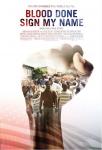“A Snapshot of Racial Tension”

| None | Light | Moderate | Heavy | |
|---|---|---|---|---|
| Language | ||||
| Violence | ||||
| Sex | ||||
| Nudity |
What You Need To Know:
BLOOD DONE SIGN MY NAME has much going for it, with strong performances and moving scenes. Regrettably, it is disjointed by following too many different stories without enough connective tissue. There is also much Christian content. One of the main characters prays, reads the Bible, and sees desegregation as a moral imperative given from God. This worthwhile message is marred, however, by an acceptance of mob rule and rioting. Caution and discernment is advised for the “mob rule” mentality of some parts of the movie.
Content:
(CC, Pa, FR, AB, PC, L, VV, N, A, D, MM) Strong Christian worldview as pastor prays, reads from Bible, mixed with some pagan, antinomian or lawless elements when an outraged crowd riots, loots, and commits arson, plus an Anti-Christian moment when a KKK man says the KKK’s burning cross is the light of Jesus, and some PC Liberation Theology; two mild obscenities, no profanities, and a few racial slurs; man is shot and beaten graphically; no sexual content; upper male nudity while swimming; drinking of beer; smoking; and, miscarriage of justice, witnesses lie on witness stand, racial hatred, man fired from job because of his desegregation views, and mob rule shown to be positive.
More Detail:
Meanwhile, Chavis arrives back in town, having completed his college degree. He begins to teach in the local school and opens a nightclub. A friend of Chavis’ arrives back from serving in Vietnam and is brutally killed by a local white man and his sons. This splits the town in two as the trial begins.
An all-white jury ultimately frees the accused local white men, even though there are eyewitnesses to the murder. This sets off rioting, looting and arson in the town. Golden Frinks, civil rights advocate and a self-described “stoker” of the flames of revolution, arrives in town and organizes a walk to the capitol.
Ultimately, the town doesn’t change too much. Tyson is fired and has to move to a new town. Frinks moves on to another city. Chavis becomes a leader of the civil rights movement and even becomes Executive Director of the NAACP. Even so, the hope is that their work in the small town had changed the citizens toward an understanding of civil rights.
BLOOD DONE SIGN MY NAME has much going for it, with strong performances and moving scenes. Unfortunately, the movie is sometimes focused exclusively on Tyson and sometimes on Chavis, and then on Frinks. Though the action takes place in a small town, these characters rarely speak to one another even when in the same room. Without a connective tissue holding the stories together, the movie suffers from being disjointed and doesn’t gain enough dramatic movement.
That said, it is a powerful and important story to be told, and a snapshot of the attitudes and problems in 1970. There is also much Christian content. One of the main characters he prays, reads the Bible, and sees desegregation as a moral imperative given from God. The worthwhile message is marred, though, by an acceptance of mob rule and rioting. For example, some members of the black community burn down tobacco storage facilities and loot the town’s stores. This seems to be accepted as okay by the supporters of the cause, but two wrongs don’t make a right.
BLOOD DONE SIGN MY NAME contains only mild foul language and one scene of violence. Caution and discernment is advised for the “mob rule” mentality of some parts of the movie.


 - Content:
- Content: 



